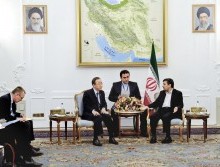
Is Iraq teaming up with Russia, Syria, and Iran? Illustrative official meeting. Photo Courtesy of UN Photo/Evan Schneider
If it sounds like nefarious planning, does that make it so? Fox News reported that Russian generals, Iranians, and Syrians all met together… not in Moscow, not in Damascus, and not in Tehran, but in Baghdad, the capital of Iraq. What does it mean? Most likely, they were meeting to discuss efforts to defend the Syrian regime in its ongoing civil war and the broader fight with ISIS (ISIL), but the persons meeting and the location lends the affair a much more significant feel with literally Biblical proportions. Is it?
- Return of Iraq to Axis of Evil
The plan after the fall of Saddam Hussein was to bring Iraq into the Western democracy fold, but that has failed so far. While the Fox News report could not confirm if Iraqi government officials were meeting with the Russians, Iranians and Syrians, the location of Iraq’s capital for the meeting clearly speaks volumes.
What’s more, CNN reported that Iraq has signed an intelligence cooperation agreement with Russia, Iran, and Syria in the battle with ISIS—again, that doesn’t necessarily mean that Iraq is in league with Iran and Syria, but it certainly looks to be headed that way if it’s not there already.
The location makes more sense when one considers that the Russians, Iranians and Syrians were working with Iranian-backed Iraqi Shiite militias fighting ISIS, according to Fox News. That’s not the Iraqi government, and the militias probably find it tougher to meet outside their country.
Still, and even if Iraq isn’t actively involved in the Syrian talks, they have at least given some level of tacit permission for the other three nations to meet in their country. It certainly appears that Iraq has joined Russia, Syria, and Iran to make a “Syrian Four” that looks suspiciously like a revival of the Axis of Evil.
- Why Low-Level Russians?
Among those at the meeting were low-level Russian generals according to Fox News, but that actually makes it more significant. Top-level officials focus on major strategy, but presumptively not the nitty-gritty details. That lower-level Russian generals were meeting with their Middle East allies indicates that the discussions were more about ground-level strategy.
The greater level of detail implies noteworthy coordination between the Russians and their Axis of Evil counterparts. That sounds less like a discussion on who is generally helping who and more like a meeting to discuss how they will work together, when, what weapons will be involved, and where. It’s close cooperation, not just general alignment.
That is probably necessary so they don’t accidentally shoot each other in the very complicated Syrian war and Iraqi fight with ISIS, but it still comes across as teamwork between allies.
- That Sounds Biblical
Russia is often associated with the enemy from the north that’s described in the Bible in Ezekiel chapter 38—end-times author Joel Rosenberg made his thoughts that Russia is Magog very clear in his novel “The Ezekiel Option”. The other allies in that list of enemies of Israel in Ezekiel 38 include Persia, which is located in modern-day Iran.
This is not to say that the Russia-Iran-Iraq-Syria meeting has anything to do with the Magog invasion of Israel. It most likely has no direct correlation. But it certainly is interesting that Iran and Russia are meeting in the Middle East even if it’s entirely benign.
Meanwhile, the location of the meeting—Iraq—includes ancient Babylon. While Babylon is not mentioned in Ezekiel, an especially decadent city named Babylon is discussed at length in the Biblical book of Revelation. Lastly, Syria is not mentioned in Ezekiel or Revelation, but the enemies that attack Israel in Ezekiel 37 come from the north—and Syria (along with Lebanon) is directly to the north of Israel. So if the armies are coming from the north, they likely would travel through Syria to get to Israel.
Again, this is not to make predictions or claim that the end is near. But it’s eye-catching nonetheless.
And that’s the overall conclusion to draw from the Russia-Iran-Syria meeting in Iraq. It’s probably a relatively innocent coordination to jointly combat ISIS and a less innocent discussion on supporting the brutal Syrian regime. But it’s still interesting, eye-catching, and a little troubling. We’ll see if this meeting proves to be as troubling as the impression it leaves.
(By Joshua Spurlock, www.themideastupdate.com, September 27, 2015)
